How Studying Abroad in San José Changed My Relationship with Food for the Better
Discovering a New Kind of Mealtime
Studying abroad exposed me to many new experiences and ideas. One of the things that had the strongest impact on me was the importance and reverence given to mealtimes. In Costa Rica, every meal we ate at home was shared. Everyone who was home at the time would come to the table and everyone would stay until we were all finished. There was added significance because of the time it took to prepare meals, the freshness of the ingredients, and the limited opportunity during the day to gather together.
I hadn’t realized it at the time, but this tradition would fundamentally reshape how I thought about food—and how I thought about connecting with others.
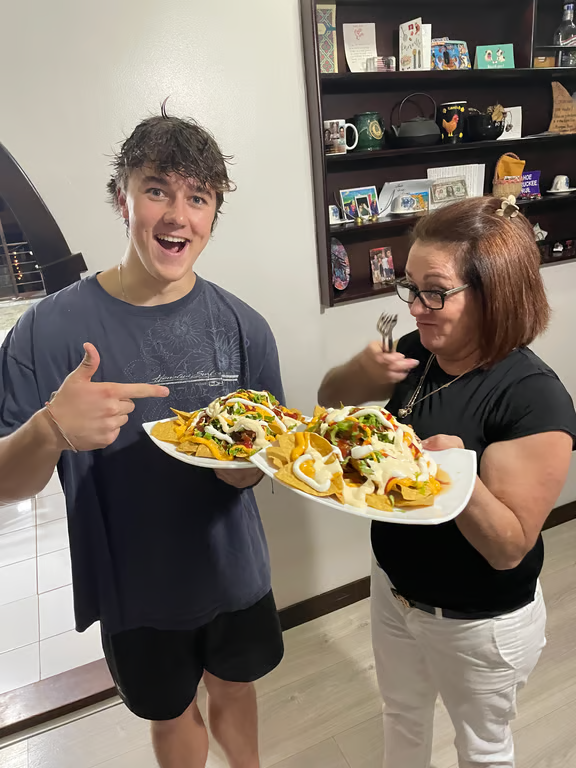
My roommate and my host mom, excited about the mountain of nachos made specially for my host-dad’s birthday
Growing Up with a “Food is Fuel” Mentality
Before Costa Rica, my relationship with food was strictly functional. I was raised to believe food is fuel and nothing more. Once my siblings and I were old enough to prepare our own meals, it became our individual responsibility. Meals were solo activities, eaten quickly and separately so we could focus on school, work, or other priorities. I think we undervalue the cultural importance of sharing food, and we also live such rapid, busy lives that we do not have time to eat slowly or share a meal with someone.
When I first got to Costa Rica, mealtimes were a cultural shock because they were so different from what I was familiar with. I had to adjust to waiting for everyone before starting or leaving the table. I had to structure my day around fixed mealtimes. And most importantly, I had to learn to slow down. That shift was uncomfortable at first, but it changed everything.
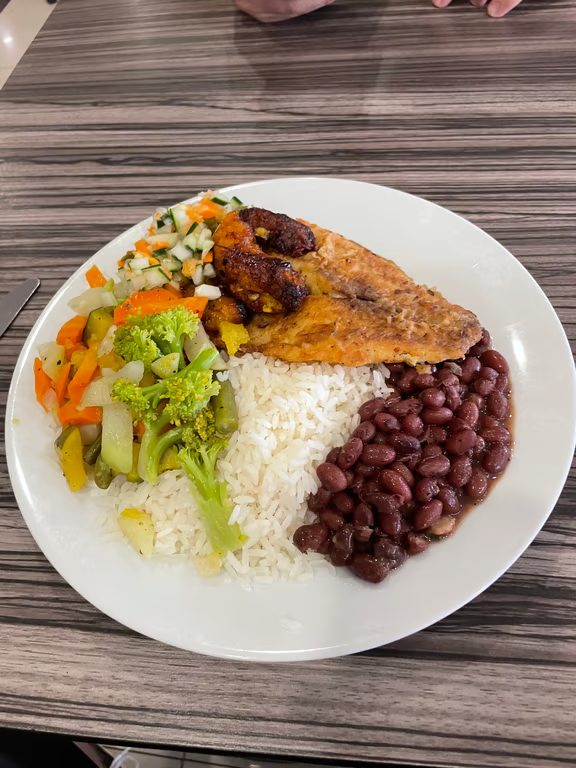
A typical Costa Rican “Casado”, which consists of a protein (usually meat), rice, beans, plantains, and vegetables.
How Shared Meals Changed My Health and Mindset
Living with my host family in Costa Rica transformed my relationship with both food and daily life. Meals were no longer just about eating. They became times for connection, reflection, and relaxation.
Here are a few ways that shift helped me:
Stronger Relationships: Mealtimes were a built-in moment to connect with my host family, learn about their lives, and practice my Spanish (especially my second night in Costa Rica when we spent an hour after dinner talking about different vitamins and minerals)
Slower Eating Habits: I began eating more slowly, which I’ve learned at school can help prevent overeating and give my body time to feel full.
Stress Relief: In a new country with the pressures of school, mealtimes have become a sacred time to decompress and just be present.
The ritual of preparing and enjoying food together taught me that food isn’t just physical nourishment, it’s an experience, emotional and social, that strengthened my bond with my host family and my roommates.
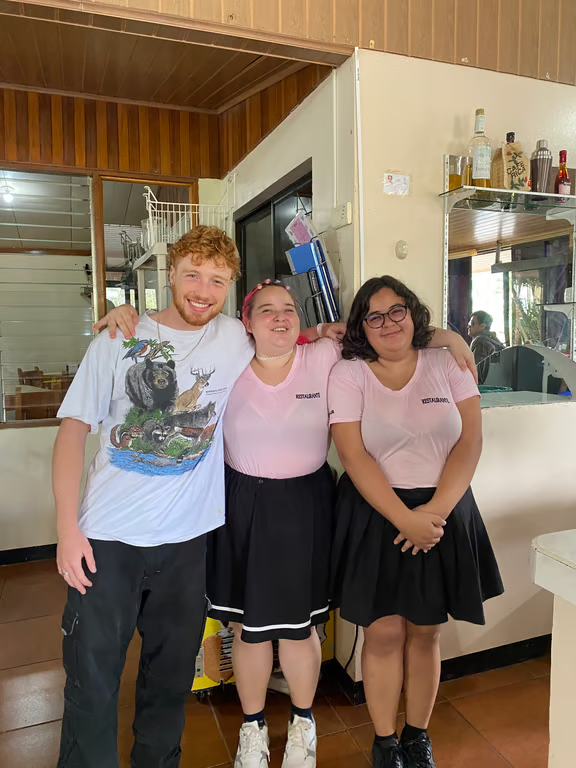
Me with two of the servers I met on a class-trip. We talked a lot on the first day of the trip and after we became friends, they started serving me HUGE portions!
Culture on a Plate: Costa Rica vs. the U.S.
Sharing meals also helped me notice just how different Costa Rican and American food cultures are. In the U.S., many meals are ultra-processed, packed with sugars and refined carbohydrates, and designed for convenience. In Costa Rica, meals were built around slow-cooked proteins, herbs from the garden, and fresh fruits and vegetables from local markets.
In addition to ingredient differences, breakfast and lunch were the biggest meals of the day in Costa Rica, in contrast to dinner usually being the biggest in the U.S. These big breakfasts gave me energy for the day, and the big lunches gave me something to look forward to. Although they were simple, there was a lot of technique and flavor involved with the meals such as fresh herbs from the garden, slow-cooking, or using same-day produce bought at the farmer's market. Meals were also leisurely and oriented around family, not rushed or multitasked like they could be here.
It wasn’t just what we ate, but how we ate it that impacted me.
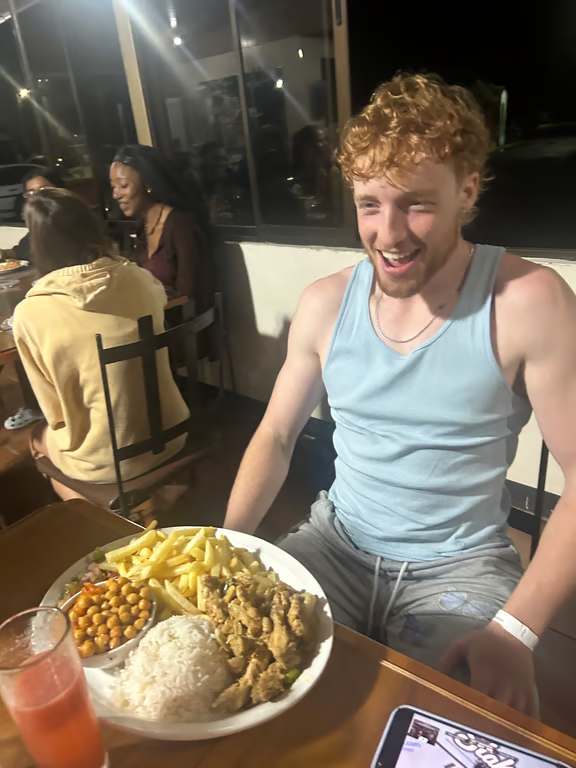
Me with one of the HUGE portions
My Advice to Future Students: Slow Down and Savor
If you’re preparing to study abroad, especially in a country like Costa Rica, I encourage you to treat mealtimes as more than just a schedule filler. They’re one of the best opportunities you’ll have to connect with local culture, take care of your mental health, and build deeper relationships. Additionally, it was where I improved my Spanish the most. I learned how passionate my host-mom is about health and nutrition, my host-brother LOVES American hip-hop, and my other host-brother loves the movie “Cars” almost as much as me.
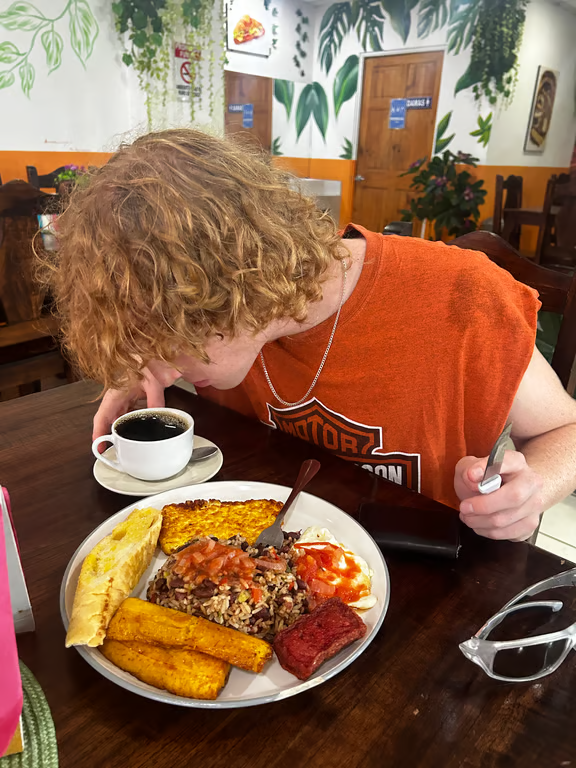
Me enjoying a cheap but hearty $5 breakfast of rice, beans, egg, sausage, bread, and plantains – ready to get the day started!
Conclusion
Living and eating with my host family while studying abroad in Costa Rica didn’t just change the way I view food—it changed the way I live. What started as an adjustment became a powerful lesson in slowing down, being present, and making space for community. Meals now mean more to me than just nutrition. They’re a daily reminder of connection, culture, and care. I highly recommend studying abroad if you can because it will change you in the ways you least expect.
This post was written by Thom Stahlecker, a CEA CAPA Alumni Ambassador from Western Washington University, and studied abroad in San José, Costa Rica.











